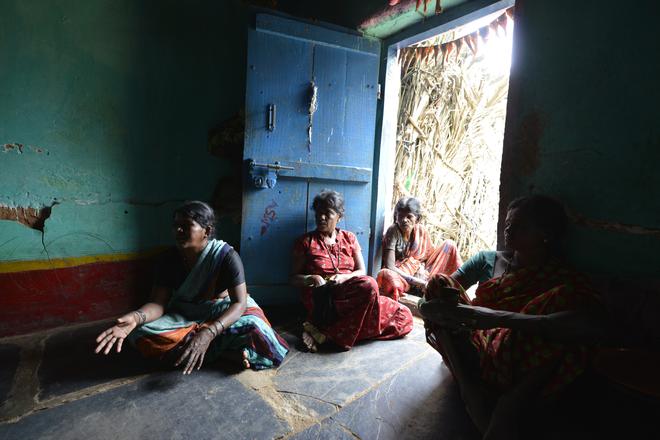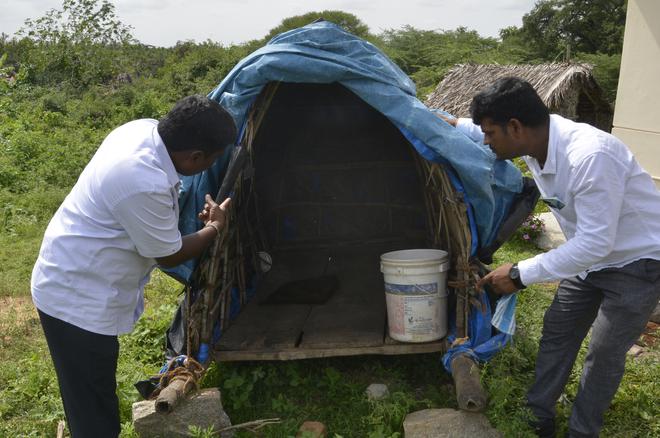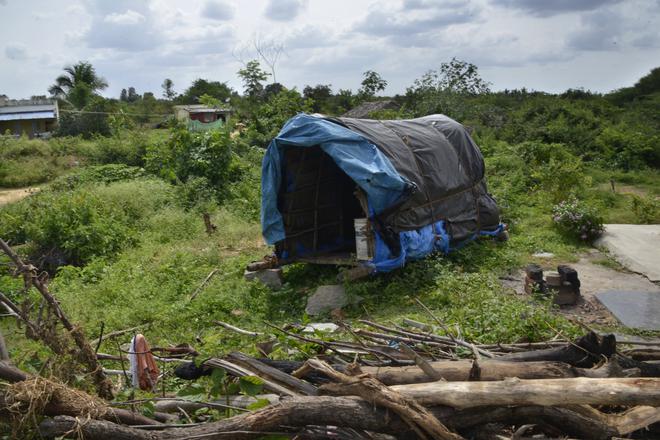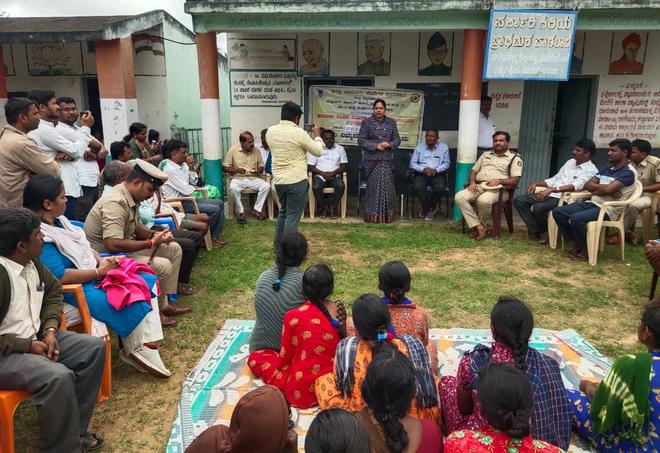Just a few kilometres off Tumakuru district, a stretch of kaccha road leads to a Gollarahatti (settlement of the Kadu Golla community) in Mallenahalli, a non-descript hamlet with mostly families who live in huts, a government school, and an anganawadi.
In a room of a particular home that can hold just about five-six people sitting close together is Vasantha, 23, clad in a faded red jacket with the hood over her head. She sits on a plastic mat, her eyes barely making eye contact with anyone. She does not speak much. Understandably so, because in the course of just over a month, she has lost two children.
This was the woman who had lost her baby allegedly due to an age-old practice among the Kadu Gollas, an OBC community in Category 1 (most backward). The traditional practice dictates that a newborn baby and the mother should stay in a makeshift tent-like structure (called gudlu) for a period of four to eight weeks, as the postpartum period is considered impure (sutaka).
Vasantha delivered twins, a girl and a boy, in her eighth month of pregnancy, on June 22. The boy died during the delivery, after which Vasantha and her daughter were brought to her mother’s house in Mallenahalli. Here, she was confined to a gudlu with her baby, even as monsoon rains lashed the village. The baby, who was not named yet, developed a fever and respiratory complications. She was taken to the hospital but died on July 23, putting the practice followed by the Kadu Golla community in the spotlight again.
A gudlu is a U-shaped wooden structure covered by tarpaulin, with an entrance that requires a person to hunch. Inside, there is a wooden plank for the mother to sleep on and a cane mora (usually used for winnowing rice) where the baby sleeps.

The fear of god
A group of Kadu Golla women — Neelamma, Nagamma, Gangamma, and Chikkamma — sit down in the small space around Vasantha and speak at length about the practice of sutaka. Postpartum and menstruating women are kept out of their houses in makeshift or semi-permanent structures for a certain number of days. They say this practice has been carried on for centuries; it is ‘normal’.
“This is an ancestral practice. If we do not do this, then it angers our god, and we do not want that,” says Nagamma. But they also take pride in saying that the practice is not as strict as it used to be.
Carefully folding her beetle leaf and popping it in her mouth, Neelamma speaks deliberately, “In earlier times, we would not take any medicines during our pregnancy or post-delivery. We would have five or six children back then. Times have changed now. When my sister’s daughter was pregnant, we told her not to take any medicines, but my daughter, who is an ASHA worker, intervened and said she must take medicines,” she says, with a hint of pride.
Once all the other women were out of earshot, Vasantha, who has studied up to Class X, says, “I do not like sitting outside. I have a lot of friends who do not practise this ritual anymore. But my family won’t listen. I, too am devoted to our god, but it need not be this way.”

Culture clashes
Back in the 15th century, “The Kadu Gollas were a nomadic, cattle-rearing community. Since they were moving from place to place, they had developed this practice to keep women safe from the elements during the tiring times of menstruation and delivery,” explains G.K. Prema, a lecturer at Sahyadri College in Shivamogga. She is one among the women from the Kadu Golla community who has fought ancient practices while also striving to protect the cultural identity of the community.
She says that in the last 50 years, the community has settled into rearing sheep and staying in one place, but the practice of building separate structures for new mothers and menstruating women has stayed. “Even though other communities have influenced them and have changed some of their ways, this belief [of women being impure at this time] remains,” she said.
The people of the community look up to Junjappa and Yetthappa, their cultural heroes, and believe that if they do not live according to the code said to be laid down by them, ill luck will befall them. Prema says that the Kadu Gollas were a culturally rich tribe, and there should be a balance between reform, especially from the perspective of women, while also preserving the community’s cultural heritage.

The lack of resources
What makes the elders of the community so averse to change? Part of the answer is evident all around the Mallenahalli Gollarahatti. Since they have not been declared a revenue village, which would give it a legal status, there is no development.
Outside every hut, there is a woodfire and big vessels to heat water for bathing. There are no drainage lines. There is only one small tank for drinking water for the hamlet of about 30 families.
Community members say that if they get possession certificates for the land they dwell on, they will be able to expand their houses and build rooms where menstruating women or new mothers can stay instead of in gudlu with barely any protection from the elements.
This problem is not limited to just one Gollarahatti but many across Tumakuru and Chitradurga districts. In 2019, the State government had ordered to declare all the Gollarahattis (along with settlements of various other backward communities), which are on government, private, and forest department lands, as revenue villages. The Tumakuru district administration has failed to do so.
Chinnappa, a Kadu Golla community leader from Tumakuru, says, “The district administration has neglected the Gollarahattis, and therefore, the hattis (settlement) are in bad condition, without any basic facilities. Kadu Golla people live in small huts. Most of the land belongs to private parties, and the landlords do not allow them to extend their houses. Due to these legal complications, the grama panchayats also do not provide any roads, drinking water, drainage, toilets, and other facilities.”
As far as education goes, he points out that due to the lack of good hostels and other facilities, many girls from the community drop out after finishing high school. The ritual plays a part here, too, as menstruating girls have to miss six days of school every month when they get their period.
“Most of the Gollarahattis are in remote places and far away from taluks and districts. There are no proper roads or public transport connecting them to the mainstream. The government should provide boarding schools for the Kadu Golla community, especially for girls. Only then will they be motivated to leave behind such practices. We can already see that educated girls in the community do not agree to practise sutaka,” said Shivakumara Swamy, advocate from the community, who works in Tumakuru.

Legal and administrative intervention
After the death of the child, Tumakuru district court judge and member secretary of the District Legal Service Authority, Nurunnisa, visited Gollarahatti and ordered the police to file an FIR against Vasantha’s husband Siddesha and her father Chikkahuligappa.
“This is being practised in places where there are no basic facilities, not even a proper road,” she says. Upset by the tragedy, she took it upon herself to talk to people about how the practice is harmful. “There can be issues like sexual abuse, as there are no doors to the tents, or depression among girls who hit menarche or new mothers, or even the chances of such tragedies recurring,” she says.
There is also an effort to create legal awareness in the community, which will help them avail themselves of basic resources. She also said that she had held discussions with the Deputy Commissioner about providing basic facilities.
Srinivas K., deputy commissioner, Tumakuru, says, “I have already held a meeting with the community leaders and appealed to them to stop practices like sutaka. I have also ordered the officers concerned to provide basic facilities like drinking water and toilets to the Hattis.
He also said efforts were on to convert the Hattis into revenue villages. “Across the district, there are a total of 620 Gollarahattis. Most of these Hattis are located on private land. They have lived there for 50-60 years. Therefore, the district administration has already notified 76 Gollarahattis as revenue villages like Lambani Tandas (settlements of the Banjara community). We have also identified another 260 Gollarahattis to notify, and then we will provide possession certificates to their houses.”
The need for balance
Many Kadu Golla community members are firm in their view that they need officials who bring in better infrastructure but those who are also sensitive enough to understand their ways. Prema says, “If we just call the practices unscientific and superstitious, they get hurt or put off. Tough legal rehabilitation will definitely help, but the responsibility of bringing reforms should equally be shared between the enlightened within the community and different wings of the government, which should provide the social justice the community deserves.”
Despite the many disagreements among various groups within the community and outside of it, there is a consensus that Vasantha’s tragedy should never happen again. Vasantha, though, in her gentle voice, says, “Yella change agbeku ri (Everything should change).”







